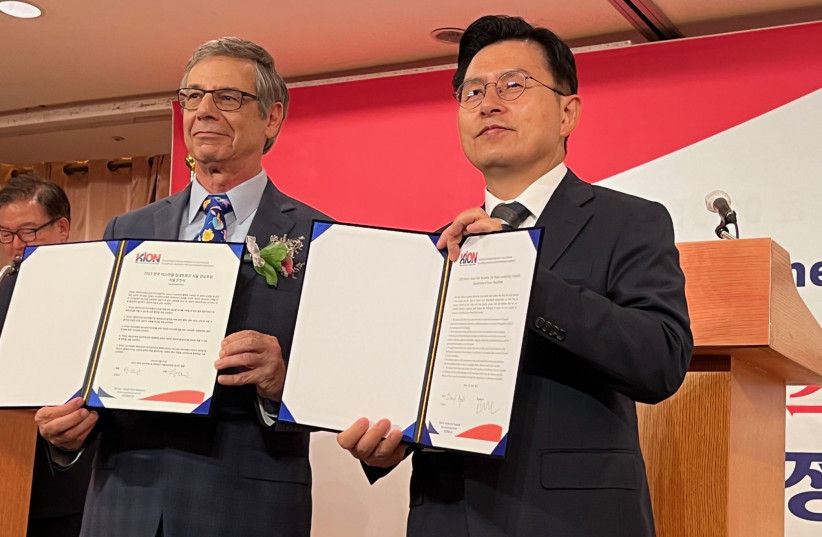Representatives from Seoul and Jerusalem signed the Seoul Leadership Summit’s Seoul Manifesto at the inaugural Korea and Israel One Network (KION) conference on Tuesday.
The declaration calls upon the countries to increase bilateral relations in politics, business, culture, media, religion, education and humanitarian aid.
It also acknowledges Israel’s right to its land based on the “Abrahamic covenant” of Genesis 12. It declares that Israel and Korea “will cooperate so that South and North Korea can achieve a peaceful, unified nation as soon as possible with a liberal democratic country.
“We declare that Israel and Korea will work together to fulfill the role of a channel of blessing,” the declaration concludes.
The declaration was signed by KION co-chairs former Israeli deputy foreign minister Danny Ayalon and former Korean prime minister Kyo-Ahn Hwang. Later all of the attendees signed the declaration in their language.
 Former Israeli Deputy Foreign Minister Danny Ayalon and former Korean Prime Minister Kyo-Ahn Hwang sign the “Seoul Manifesto.” (credit: MAAYAN HOFFMAN)
Former Israeli Deputy Foreign Minister Danny Ayalon and former Korean Prime Minister Kyo-Ahn Hwang sign the “Seoul Manifesto.” (credit: MAAYAN HOFFMAN)KION is a faith-based organization founded by Korean Zionist Christians to recruit more than a million Koreans to defend Israel and fight against antisemitism in Korean churches and media.
Several Korean politicians, businesspeople, and a handful of Israeli officials attended the event, including Deputy Mayor of Jerusalem Fleur Hassan-Nahoum. She called on the country to move its embassy from Tel Aviv to Jerusalem.
Later in the day, she met with Korea’s deputy mayor and delivered a letter from Jerusalem Mayor Moshe Lion to Seoul Mayor Oh Se-hoon inviting him to visit the Holy City.
Diplomatic ties, but no Korean president has visited Israel
Israel and Korea have had diplomatic relations for six decades. However, until now, no Korean president has visited Israel. President Reuven Rivlin visited South Korea in 2019, and President Shimon Peres in 2010 before him.
Foreign Minister Eli Cohen visited Seoul earlier this month, marking the first visit of a sitting foreign minister in nine years.
“Relations are not as close as we would like them to be,” admitted Israel Ambassador to South Korea Akiva Tor.
Although bilateral trade between the two countries rose by 35% in 2021 to around $3.5 billion following the signing of a Free Trade Agreement – Korea’s first FTA in the Middle East and Israel’s in Asia – Tor said the potential is as much as $10 billion. He described Korea as a country strong in marketing and high-tech production that Israel’s innovation could enormously enhance.
He highlighted Hyundai’s efforts to develop the world’s leading autonomous vehicle.
“Korea will provide the hydrogen cell, the battery, the design, marketing and skill, but will require Israel’s destructive code – or at least it certainly would help,” Tor told The Jerusalem Post.
He also noted the potential for solid trilateral relations between Israel, Korea and the United Arab Emirates in clean technology.
“The Abraham Accords caused Korea to take note that there was a tectonic change in the region. I think we are going in the right direction,” Tor said.
Former National Assembly member Kyungwook Min agreed, noting that “Korea is dependent on oil-producing countries, so Israel and Korea could not be as close as we wished.
“The Abraham Accords could have a profound influence on our relations. If the Arab nations have good relations with Israel, we can also increase cooperation,” Min said. “Still, politicians can be fairly constrained and get attacked by naysayers who say close ties with Israel will jeopardize our elections with these Arab countries.”
Former prime minister Hwang told the Post he recently visited Israel and was impressed by its drop irrigation systems and ability to maximize water resources.
“In Korea, we don’t have enough water, and we can learn how to resolve this issue from Israel,” he said. Similarly, Ayalon said that Korea and Israel are poised to “work side by side with technology to make our planet continually inhabitable and hospitable to mankind – not just for us, but for generations to come.”
Hwang added that another one of Korea’s challenges is security.
“Israel is excellent in the area of military technology, and this is one area of cooperation that Korea and Israel can work on immediately,” Hwang said. “The second area: We are talking in Korea about a fourth industrial revolution, and Korea has outstanding information and advanced technology compared to the rest of the world.
“Israel has advanced technology too,” he continued, “and I think we could work with Israel to help fill some gaps.”
More than one-third of the Korean population is Christian, which Hwang said is critical to Korean support for Israel.
“Deep relations are being built between the Christian community [in Korea] and Israel,” Hwang said, highlighting the influx of Korean tourists to the Holy Land. According to the Korean Embassy to Israel website, around 60,000 Koreans visit Israel yearly.
KION rhymes with Zion, noted Ayalon.
“To find a Korean society that so much appreciates the Bible and the word of God is really a privilege,” he said.
“This relationship will help build the connection between the countries,” Hwang added. “Korea and Israel can look toward a new future together. The relationship between Korea and Israel will become the light in a dark world.”
A second KION conference is expected to take place in November in Jerusalem.
”